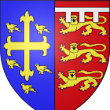Duke of Norfolk ..
Earl Marshal ..
Lords Appellant ..
‘Good Parliament’ of 1376 ..
As a result of his involvement in the power struggles which led up to the fall of Richard II, he was banished and died in exile in Venice.
Mowbray was the second son of John de Mowbray, 4th Baron Mowbray, and Elizabeth de Segrave, suo jure Lady Segrave, daughter and heiress of John de Segrave, 4th Baron Segrave, by Margaret, daughter and heiress of Thomas of Brotherton, son of Edward I.[1] He had an elder brother, John de Mowbray, 1st Earl of Nottingham, and three sisters, Eleanor, Margaret and Joan (for details concerning his siblings see the article on his father, John de Mowbray, 4th Baron Mowbray).
In April 1372, custody of both Thomas and his elder brother, John, was granted to Blanche Wake, a sister of their grandmother, Joan of Lancaster.
On 10 February 1383, he succeeded his elder brother, John Mowbray, 1st Earl of Nottingham, as Baron Mowbray and Baron Segrave, and was created Earl of Nottingham on 12 February 1383. On 30 June 1385 he was created Earl Marshal for life, and on 12 January 1386 he was granted the office in tail male. He fought against the Scots and then against the French. He was appointed Warden of the East March towards Scotland in 1389, a position he held until his death.
He was one of the Lords Appellant to King Richard II who deposed some of the King's court favourites in 1387. He worked his way back into the king's good graces, however, and was likely instrumental in the murder, in 1397, of the king's uncle (and senior Lord Appellant), Thomas of Woodstock, 1st Duke of Gloucester, who was imprisoned at Calais, where Nottingham was Captain. In gratitude, on 29 September 1397, the king created him Duke of Norfolk.
In 1398, Norfolk quarrelled with Henry of Bolingbroke, 1st Duke of Hereford (later King Henry IV), apparently due to mutual suspicions stemming from their roles in the conspiracy against the Duke of Gloucester. Before a duel between them could take place, Richard II banished them both. Mowbray left England on 19 October 1398. While in exile, he succeeded as Earl of Norfolk when his maternal grandmother, Margaret of Brotherton, Duchess of Norfolk, died on 24 March 1399.
He died of the plague at Venice on 22 September 1399. Bolingbroke returned to England in 1399 and usurped the crown on 30 September 1399; shortly afterward, on 6 October 1399, the creation of Mowbray as Duke of Norfolk was annulled by Parliament, although Mowbray's heir retained his other titles.

